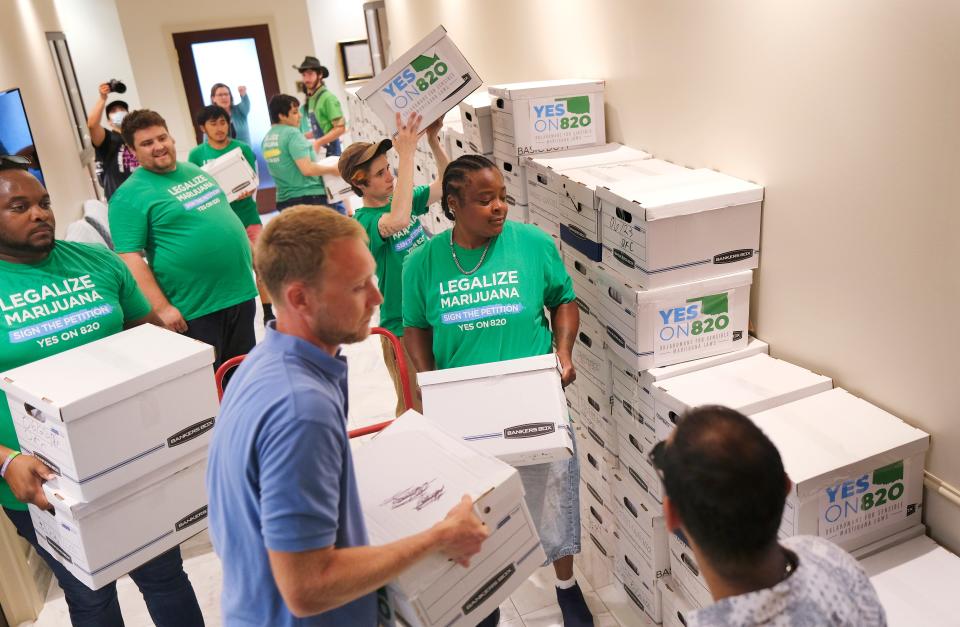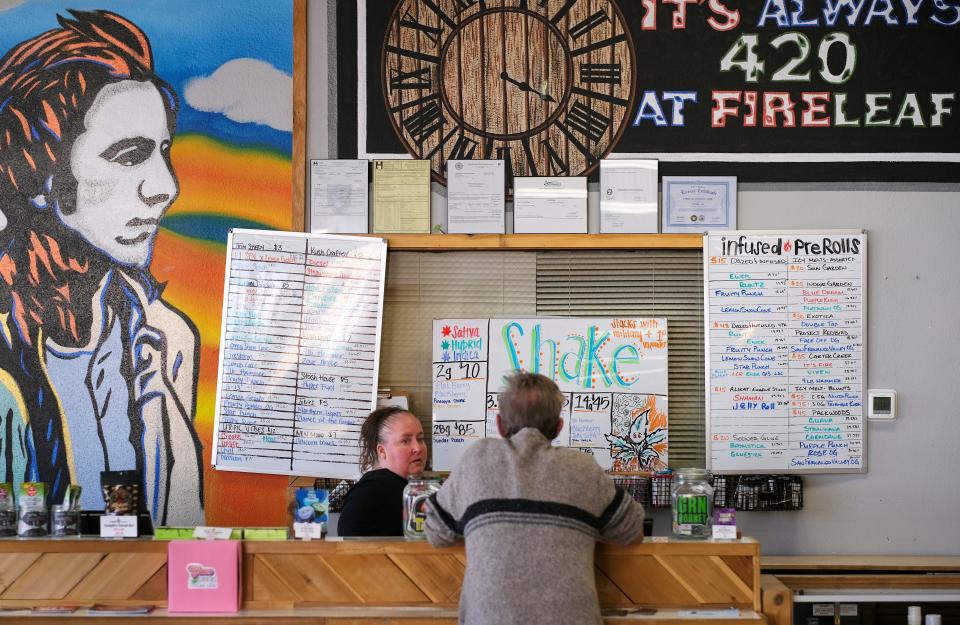Oklahoma’s next big election will ask voters to legalize recreational marijuana
As the decades-long push to legalize marijuana state-by-state nears the halfway point, Oklahoma could provide an interesting case study when voters decide whether to legalize adult cannabis use in March.
Twenty-one states have now legalized recreational marijuana use, including Missouri and Maryland, where voters this month approved ballot questions.
But voters in Arkansas, North Dakota and South Dakota, where deeply conservative politics more align with Oklahoma, recently rejected similar ballot measures.
“The low-hanging fruit for legalization has been picked, and going forward the battles could be a bit tougher,” said Chris Walsh, CEO of MJBiz, an annual cannabis business conference, which was held last week in Las Vegas.
“We are talking about (tougher battles) in deep red states ... and there is going to be more organized opposition.”
More:Why recreational cannibas question isn’t on the November ballot
Opposition to State question 820, which will come before voters on March 7, has already begun to emerge, including from Oklahoma’s Republican governor.
“It is still illegal federally. We should not have a checkerboard of jurisdiction across the states,” Gov. Kevin Stitt said last month during a debate, where he said he would oppose the ballot question.
Oklahoma Southern Baptists, the state’s largest religious group, also recently condemned SQ 820, issuing a statement that it believes marijuana has destroyed families and communities.
But Oklahoma voters have already approved a robust medical marijuana program, which has led to some of the highest usage rates in the nation, setting a foundation that some believe bodes well for a supportive vote in less than four months.
“It’s hard to tell how this is going to play out in Oklahoma,” Walsh said about the March election. “It was surprising that Oklahoma legalized (medical marijuana in 2018). It's basically a Wild West, wide-open market now and we’ll see where voters decide to go next.”
Record expungement component could be key in pushing support for SQ 820

Supporters of SQ 820 appear poised to push an aggressive statewide campaign, which could become more visible in the coming weeks.
Yes on 820, a political organization, has already spent more than $2.6 million, drawing financial support from several national organizations.
The American Civil Liberties Union contributed $562,000, and The Just Trust, a pro-criminal justice reform nonprofit, has contributed more than $1 million, according to recent state political action committee finance records.

A campaign field staff is in the process of being hired, said Michelle Tilley, a spokesperson for Yes on 820.
While supporters of SQ 820 plan to promote recreational marijuana use as a way to increase jobs and tax revenue, a major talking point will likely include the ballot’s inclusion of expungement of criminal records for some types of low-level marijuana offenses.
“One of the biggest drivers of this is the decriminalization aspect of it,” Tilley said.
More:Biden pardons thousands for 'simple possession' of marijuana
Jared Moffat, the state campaigns manager for the Marijuana Policy Project, said the criminal justice reform aspect of SQ 820 could be critical to getting voter support, especially in a state like Oklahoma, which has high incarceration rates.
“Part of the motivation to legalize cannabis is because too many lives have been ruined (through incarceration), and that’s something voters can understand,” Moffat said. “I think it’s going to be important for the campaign in Oklahoma to educate voters about how they are trying to create a responsible system of regulations and give the state more control over the sale and production of cannabis that is already happening, then voters become more comfortable with it.”
Marijuana tourism could increase the industry with SQ 820 passage, supporters say

Since medical marijuana use was legalized four years ago, the cannabis industry has exploded across the state, with dispensaries in many urban neighborhoods and small towns.
Nearly one in 10 Oklahoma residents has a license to purchase and use marijuana.
But Arshad Lasi, the CEO of The Nirvana Group, a cannabis producer and seller, said Oklahoma's saturated market needs the boost that would come with legal recreational use.
“You've got about roughly 400,000 card holders and thousands of businesses ... so everyone is fighting for their place in the market," Lasi said.
"But when you go to a true recreational adult-use market, you’ve got some cannabis tourism going on from surrounding states. Oklahoma has some of the lowest prices of cannabis in America, so folks who want to consume cannabis but don't want to spend a lot of money on it are able to come and experience that."
The recent voter-approved ballot in Missouri will bring some competition closer to Oklahoma.
But Kansas, Arkansas and Texas do not have legal cannabis use.
"With a state like Texas, people are absolutely going to come up to Oklahoma (for marijuana)," said Walsh, the MJBiz CEO. "Tourism will be a big component (if SQ 820 passes)."
Tilley, with Yes on 820, said she believes voters will see the economic value in legalizing recreational marijuana, especially since many communities have already seen the medical marijuana industry bring new businesses and jobs.
Recreational marijuana approval would have economic impact in Oklahoma
If approved, recreational marijuana sales would have a 15% excise tax, with a portion of the funds going to local governments, schools, drug addiction treatment programs, the court system and the state's General Revenue Fund.

"We need to diversify our economy in Oklahoma and this is a great way to do it," Tilley said.
Supporters of SQ 820 had originally wanted a November election but Stitt set the March 7 election date, meaning the initiative will receive increased attention without as many candidates and questions sharing the ballot.
"This is the first time there has been kind of a standalone election on cannabis in the country," said Moffat, with the Marijuana Policy Project. "It’s obviously a question of turnout ... but I would say that even among most if not all voting segments, with maybe the exception of very old voters, cannabis legalization has support."
This article originally appeared on Oklahoman: Marijuana legalization will be on the ballot in Oklahoma in March
